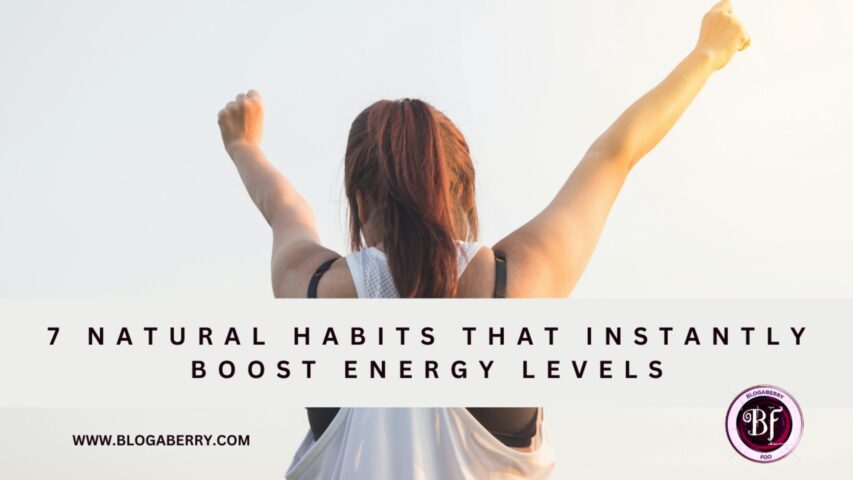


We’ve all had those low-energy days where we just don’t seem to have the motivation or the gas in the tank to get things done. When even a day of doing next to nothing doesn’t feel like it recharges you that much. There are a variety of factors that influence our experience of energy levels, and as such, multiple approaches can be taken to address the problem. Here, we’re going to look at some daily habits and choices that can help you turn the energy back up in a way that’s natural and healthy.
As mentioned several times before, sleep is the foundation of your energy. During deep rest, your body repairs muscles, balances hormones and restores mental clarity. Adults should aim to sleep for 7-9 hours per night, keeping a consistent bedtime and wake-up schedule even on weekends.
Improve your sleep hygiene by avoiding using screens too close to the bed, keeping your room cool and dark, and trying to establish a relaxing wind-down routine. Otherwise, not getting the sleep you need can result in higher levels of cortisol (commonly called the stress hormone), which can tire you out. It can also lower your testosterone levels, which are also linked to energy levels. When your sleep quality improves, you’ll notice sharper focus, better mood and more stamina for workouts and daily tasks.
Simply getting enough calories every day isn’t enough. If you’re trying to fuel your body with low-value junk, then it should be no surprise that you feel like junk, as well.
Structured eating habits are important as well. Your metabolism is how your body burns energy, so anything that knocks it off-kilter can make you feel lethargic. Skipping meals or relying on processed foods high in sugar and refined grains can cause a spike in blood sugar levels followed by energy crashes.
Instead, you should focus on whole, nutrient-rich foods that provide steady fuel: lean proteins, complex carbohydrates, healthy fats and plenty of colourful fruits and vegetables. Routine meals throughout the day, with a few healthy snacks in between, can allow your metabolism to work smoothly.
You may think that moving around spends energy, but it also improves how energy is created and distributed throughout your body. This is because exercise improves your blood circulation, helps oxygen get to cells across the body and releases endorphins that improve your mood.
Both strength training and cardio contribute to higher energy levels: cardio enhances endurance and heart health, while resistance training builds muscle and helps regulate hormones like testosterone. Consistency matters more than intensity; even 20-30 minutes of daily activity can have profound benefits. If you’re tired, even just a little low-impact exercise like walking, yoga, or stretching can make sure that you’re keeping the system active without straining it too much.
Although it might sound too simple to be of any real help, your hydration levels actually play a huge role in how energetic you feel. Water is needed for practically every process the body understands, including energy metabolism, nutrient transport and temperature regulation. Even slight dehydration can cause fatigue, headaches and reduced focus. If you often feel tired mid-afternoon, drinking water may be more effective than a third cup of coffee.
The aim should be to drink roughly half your body weight in ounces every day, bearing in mind that you may need more on hot days or when you exercise. If you feel that you keep forgetting to drink water, try setting reminders on your mobile phone for the same.
The right supplements can do a lot to fill in nutritional gaps or help boost your energy levels a bit. For instance, vitamin D, magnesium and B vitamins deficiencies are all common culprits behind feelings of low energy. As we’ve already looked at, hormone levels can play a more profound role in your feelings of energy and motivation than you may have known. For men, especially, testosterone levels naturally decline with age, which can affect energy, muscle strength and recovery.
Some explore testosterone-support supplements from providers like PharmaGear to help maintain vitality. If you’re making any changes to your supplements, especially related to your hormone balance, it’s a good idea to do it under the advice of your doctor.
PS: Always consult your doctor before taking supplements and medication.
Testosterone isn’t the only hormone that can affect your energy levels. We also mentioned cortisol, the stress hormone. This hormone can affect your sleep levels, immunity and the balance of your other hormones, in general. If your body is routinely in “fight or flight” mode due to the release of cortisol as a result of frequent stress, then it’s going to leave you feeling fatigued and demotivated.
Incorporating stress-management techniques such as meditation, deep breathing, journaling and using apps like Headspace can reset your nervous system and restore mental clarity. Scheduling downtime is just as important as scheduling workouts. Lowering your stress levels allows you to better conserve your energy for the things that actually demand it.
Energy is all about rhythm. In particular, your circadian rhythm (or your body’s internal clock). When your habits throughout the day align with it, it can help you rest better at night and feel more alert during the day. Start your mornings with natural light exposure to wake up your system, and try to eat and exercise around the same times each day to reinforce consistency. Break tasks into manageable chunks and take short movement breaks to avoid mental fatigue.
Not only can reliable daily routines help you better live to your natural circadian rhythm, but they can also reduce decision fatigue, allowing you to save your energy for when you really need it. Structure leads to stability, which leads to reliable and steady energy levels.

Usually, adjusting our natural habits a bit can help our body work to the best of its ability. Of course, work, lifestyle and people around us may or may not help us achieve the same, but we can do our best for our body. In any case, if you’re feeling chronically tired, regularly low on energy or none of the tips above seem to give you back the pep in your step, then it may be time to talk to your doctor about it. Talking to a good doctor can guide us to living a healthy and energetic life.
Photo by Tirachard Kumtanom.